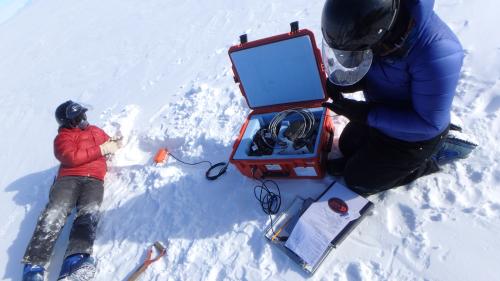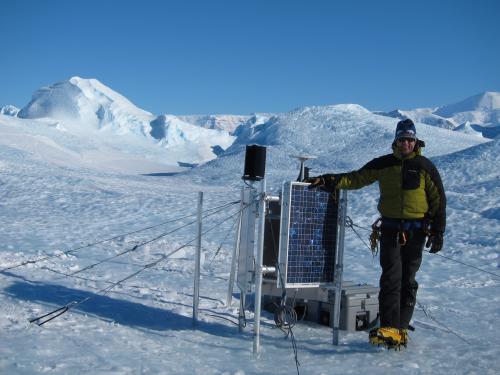This journal entry was written a number of weeks ago and is only now being posted (Nov. 12). It has been a long few weeks dealing with the loss of Gordon, but I wanted to finally share my thoughts on his passing and the man.
On Saturday, October 22nd, after a day in the field with Gordon, Lynn, and Peter, we were returning to the Shear Zone camp when unexpectedly tragedy befell our group when Gordon Hamilton and his snowmobile fell into a deep crevasse in the Shear Zone. The fall was fatal and we have lost a friend, colleague, father, husband, teacher, and so many other things.
It has now been four days since we were pulled from the field. This has been a challenge for me in how to share this accident with you all and whether I even should given that there are any number of press releases and newspaper accounts currently out there. As I read over them though, it became apparent that I did have something to contribute to remembering Gordon, how he should be remembered, and his impact.
 Lynn and Gordon work to install a geophone out on the Ross Ice Shelf.
Lynn and Gordon work to install a geophone out on the Ross Ice Shelf.
For my students and others, it's important for you to understand that there is risk in what Gordon and so many other scientists do every day. Working in the harsh environment of Antarctica comes with risks – some known and some unknown – and the National Science Foundation (NSF) along with the United States Antarctic Program (USAP) do everything they can to minimize the risks for the scientists. If you have been reading my blog you are well aware of the number of trainings that we undertook prior to going out into the field (and there were still more that I didn't write about), all with the intention of keeping us safe and reducing risk. In addition to that, add in our collective experience on and around glaciers, crevasses, and cold environments, and the risk is further reduced.
There is risk in our daily lives – even if you are not in Antarctica. We do a great many things to reduce the risks that you may encounter (knowingly and unknowingly) every day. For example, in a car there are seat belts, air bags, bumpers, crumple zones, and reinforcements, all designed to minimize the risk of injury if you are involved in a accident. These safety devices do not however remove risk, they merely reduce it. When you get into the car you accept those risks and for the grand majority of time all of your training and those of the drivers around you contribute to the safety of all – but accidents do happen.
What happened on Saturday this past week was a horrible accident and we are all still dealing with the outcomes of that. But it was an accident. Gordon, along with all of the team, prepared and practiced how to avoid accidents and minimize risk – but as was the case on Saturday, you cannot be 100% protected. Kelly Falkner, the director of the National Science Foundation’s Division of Polar Programs, summed this up in a statement in regard to the accident, “The death of one of our colleagues is a tragic reminder of the risks we all face — no matter how hard we work at mitigating those risks — in field research.”. The NSF along with USAP has already begun to investigate this accident and may or may not propose additional safety measures if necessary to reduce risk further with the full understanding that all risk cannot be removed.
In this video, produced by the University of Maine's Climate Change Institute, Gordon Hamilton explains the importance of the scientific work done by himself and others in Greenland and Antarctica to those who live elsewhere in the world. What happens in the polar regions does impact us all ...
Gordon was nothing if not passionate about his chosen field of research – glaciology and climate change. In his own words: "I can't think of another job I'd rather be doing." Susan J. Hunter, the president of the University of Maine where Gordon was a professor, said in a statement that Gordon's “glaciology research around the world — from Antarctica to Greenland — was second to none.”. A statement that many others would agree with. It was personally rewarding to him on a number of different levels from intellectually to a personal challenge. There have been a numerous articles written about Gordon and his contributions to glaciology and climate change in the few short days since his passing – those articles do a far better job than I could do to share his contributions. I would highly recommend that you read the New York Times article.
New York Times - For Gordon Hamilton, a Life of Discovery and Danger
New York Times - Gordon Hamilton, Climate Scientist, Dies at 50 in Antarctica Accident
Washington Post - Researcher killed in icy 100-foot plunge was ‘smart,’ ‘fun’
Boston Globe - UMaine researcher dies in 100-foot plunge into icy crevasse in Antarctica
 Always the adventurer, explorer, and educator – Gordon Hamilton was at home in the icy locations of our planet.
Always the adventurer, explorer, and educator – Gordon Hamilton was at home in the icy locations of our planet.
What I can say is that Gordon was an extremely smart, charismatic man that made me laugh so hard my stomach hurt. He had a wit that when combined with one of his many "looks" made long hard work days all the more enjoyable. He was always thinking about the impact his work was having, but doing so without the ego. I would describe him as humble for someone who has accomplished so much in a field that when he started the biggest question was "Why would you want to study glaciers?". He understood the importance of what he was doing, would explain it whenever possible, and did his work with a curiosity that, although it sounds cliche, was infectious. He will be sorely missed by so many – and selfishly missed by me as a growing friend and colleague who I looked forward to working with in the years to come.
This evening in McMurdo we had a gathering in memory of Gordon, sharing stories and remembering the legacy that he has left behind. McMurdo is a community that has felt the impact of Gordon's passing strongly, but the impact was farther reaching than just USAP with thoughts arriving in from other Antarctica bases and operations from the British Antarctic Survey, to New Zealand, to Italy, and more. A Scottish toast – the first of many – was raised in his honor by all of us in McMurdo for the passing of our friend and colleague.
Thank you Gordon for all that you have done – you will be missed.


Comments